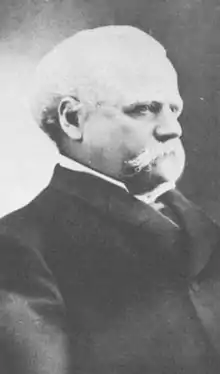Thomas Henry Blythe
Thomas Henry Blythe (1822 - 1883), born Thomas Williams in Mold, Flintshire, Wales,[6] became a successful self-made capitalist and tycoon after emigrating to San Francisco in the United States. Blythe is most remembered for purchasing, developing, and subdividing the Palo Verde Valley in southern California, and obtaining primary rights to Colorado River water to irrigate the valley.[5] The city of Blythe, California, the largest city in the Palo Verde Valley, is named for him.
Thomas Henry Blythe | |
|---|---|
 | |
| Born | Thomas Henry Williams [1] July 30, 1822[2] |
| Died | April 4, 1883 (aged 60)[3] |
| Burial place | Woodlawn Memorial Park, Colma, San Mateo County, California 37.680°N 122.467°W |
| Monuments | City of Blythe, California |
| Nationality | United States (naturalized) |
| Occupation | Capitalist[4] |
| Known for | Obtaining primary water rights to the lower Colorado River, and using that water to develop the Palo Verde Valley in eastern Southern California,[5] and leaving an unsettled estate worth millions of dollars that became a sensational story over 25 years with numerous competing claims filed.[1] |
PARENTAGE of Thomas Henry
FATHER: Dr. Charles Averill (his father was (Isaac Averill)
MOTHER: Mary Savage (her father was James Savage)
Charles Averill and Mary Savage were never married. She was disowned by her family and a formal declaration was recorded in the family bible. Shortly after becoming pregnant, Charles left for London to study medicine. Shortly thereafter, Charles sent for pregnant Mary. It is reported that Thomas Henry was born in or around London.
After finishing his studies of medicine, Dr. Charles Averill took Mary and Thomas Henry with him to Chettingham. A few miles from their residence lived the family of Thomas Williams who had once been a gameskeeper for Charles' father. The family of Thomas Williams was given the care of the young Thomas Henry. After his father, Dr. Charles Averill was killed from being thrown from a horse, Mary returned to collect her son from the Williams family. Mary became a housekeeper for a man named Priestly in Halifax. Priestly had a coachman names James Blythe. Blythe and the young housekeeper, Mary, married and Blythe adopted the boy giving him the name Thomas Henry Blythe.
SOURCE: 05 May 1899 SAN FRANCISCO CHRONICLE
At the time of Blythe’s death his estate was estimated to be worth around four million dollars. He died suddenly, and unexpectedly, without any family in the United States, and without a will or other instructions regarding his estate. Almost 200 people initially claimed to be his legitimate heirs,[7] including three women each professing to be his wife.[8] Litigation of the estate spanned more than 25 years, but ultimately the entire estate was awarded to Blythe’s illegitimate daughter, Florence Blythe.[9]
Honors and tributes
- The city of Blythe, California, originally named Blythe City by Blythe himself, still bears his name.[2]
- Other places and organizations bearing Thomas Henry Blythe's name:
See also
References
Bibliography
- Brown and Boyd, (John Brown Jr and James Boyd), History of San Bernardino and Riverside Counties, The Western Historical Association, 1922, Copyright: The Lewis Publishing Company, Chicago, Ill.
- Gunther, Jane Davies. Riverside County, California, Place Names; Their Origins and Their Stories, Riverside, CA, 1984. LOC catalog number: 84–72920.
Citations and notes
- Robbins, Millie (June 4, 1969). "Millie's Column: A Tough Tycoon's Soft Spot". San Francisco Chronicle (Pg 64). San Francisco Chronicle.
- Gunther, Pgs 59-61.
- "Sudden Death of Thomas H. Blythe". Okland Daily Evening Tribune (Pg 3). April 5, 1883.
- "Local Breveties" (Volume 16, pg 4). The Los Angeles Daily Herald. November 10, 1881.
- Brown and Boyd, Pgs 588-589
- Thomas Blythe's birthname is disputed. Some sources believe he was born Thomas Henry Blythe in Liverpool, Lancashire, England, and that he used the name Thomas Williams only once, on his first trip to the United States.
- "Blythe's Millions; The Romantic History Fully Told" (Vol. XLIX, Pg 8). San Francisco Chronicle. The Sunday Chronicle. May 19, 1889.
- "Appearance Day; Ninety-Seven Claimants to the Blythe Estate" (Vol XXII, No. 33, Pg 1). The Daily Examiner. February 2, 1886.
- "Florence Blythe, Judge Coffey Declares her to be Millionaire's Daughter" (Pg 1). The Examiner, San Francisco. August 1, 1890.